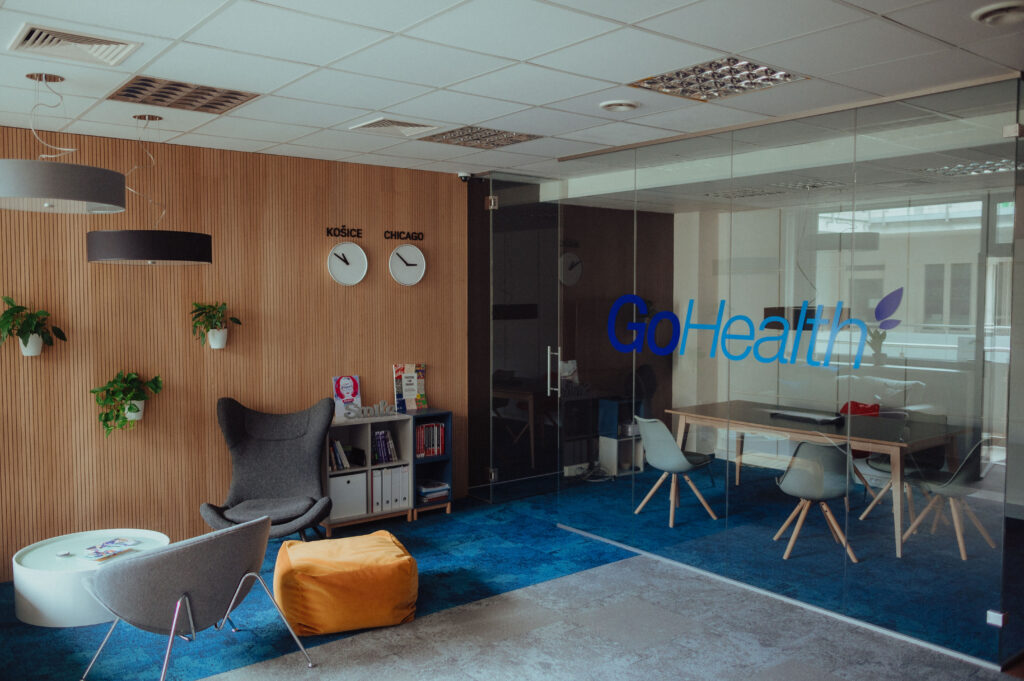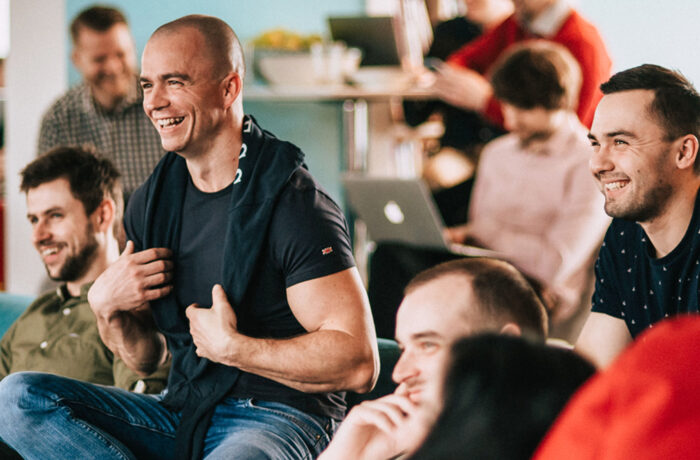It’s safe to say that looking for a new job and applying for different roles might be an overwhelming situation. Not knowing what to expect from the interviewing process is stressful, at least. Hiring processes of course differ from company to company, nevertheless, we’ve gathered first-hand information that might help you navigate through your technical interviews.
What does a tech interview look like at GoHealth Slovakia? If you want to get a brief idea of what an interview usually looks like in a technology company, you can expect these steps (more or less — every interview process depends on a specific role and its seniority):
- Initial phone screen — performed by HR/Recruiting — initial check to cover the absolute basics to confirm that this person is indeed interested in the role and they are what they say they are online or in a resume, main focus areas are to explain the company and the role, motivation, expectations, experience, and tech stack.
- Home assignment — only for certain very specific roles, usually a quick coding exercise or a similar nontechnical exercise/assignment to determine candidates’ approach, thinking, experience, and technical abilities
- 1st interview — performed by HR/Recruiting and Senior Engineers — consisting of two parts:
– The first HR part is a friendly casual conversation reflecting our cultural and working environment, trying to determine if the candidate and the team are a mutual cultural match, also trying to answer all questions by the candidate.
– The second part is mostly technical and it includes questions related to motivation & interest and involvement of the candidate in the applied area, previous job experience and/or education, and technical expertise in the required area, followed by a hands-on exercise (usually live coding or similar non-technical exercise for non-development roles) - 2nd interview — performed by a technical lead or engineering manager from either our Slovak or American team, consists of a live coding assignment and/or theoretical and specific job-related technical questions, meant to both dive deep as well as to test the width of one’s skill set.
- Executive interview — usually the final interview with a VP of Engineering or a similar head of an organization team, less formal interview discussing a whole range of topics including candidate’s preferences, their involvement and contribution to the team and company, their potential future role, company development strategy, plans, tech stack, role, and conditions. Summarizing all job-related information and answering all the questions that the candidate still has about the company, the team, our vision, and the job position itself.

We’ve set up a concise list of Dos and Don’ts for your technical interview to gather inspiration from. We don’t dare to guarantee your success based purely on these steps, but we dare to say you definitely will make a great first impression.
FOCUS ON THESE:
- Test your setup — Be prepared for online interviews. Make sure your internet connection, camera, and microphone are working properly, keep your camera on and let the interviewers see you. This will make the interview more cozy and friendly.
- Customize your CV to the position you’re applying for — Yes, it’s admirable to have dozens of different certifications, courses, and many different job experiences. However, it’s important to make sure to customize your resume with the things that match the position you are trying to apply for the most. Be concise. In most cases, a two-page resume can express your experience very well.
- Show interest in the company — Research all the available information about the company you’re applying to. Whether it’s their web page or social media, show that you took your time to learn as much as possible about your (hopefully) future employer. A little bit of googling won’t hurt. Understand what the company does, how they make money, and what you will be doing.
- Prepare questions, engage — Interview is a conversation, it’s important to engage in the discussion. If you’re feeling uneasy about the topics that might stand out, prepare a list of clarifying questions so you have something to lean on. Provide your feedback or tips for possible future enhancements of the project.
- Home assignment — Think of it as a project you are doing in collaboration with your colleagues: It’s normal to get stuck while trying to find the solution to an issue, or to get stuck because you don’t understand the task. When you are working on the home assignment and you feel you’re stumbling, don’t hesitate to write to your interviewers and ask for direction or small help. It shows a lot about your collaborative personality and makes a positive impression.
- Live coding — Sometimes there’s just a home assignment, sometimes just live coding, oftentimes both. Be prepared for every situation. Most assignments are open-ended, so verify requirements and state assumptions to make sure you are solving the right problem. The live-coding interviews are very short and there is no time to spare. The interviewer is there to provide guidance that will lead you to the correct solution in case you get stuck. Do not stress over perfect solutions in live coding. Working naive solution is a great stepping stone to a better performant and structured solution.
- Be open — Don’t be afraid to show who you really are both professionally and in your private life. Talk about the technologies you are most keen about, even when you don’t have professional experience with them, or achievement that you are most proud of, even when it is not 100% relevant to the position you are applying for.
- Be honest — Admit when you don’t know the answer. Interviewers are professionals who appreciate honesty. It’s important to show that you’re able to evaluate your skills and abilities. But be careful not to get into self-destructive mode. Know your worth, be aware of your faults.

AVOID THESE:
- Showing you’re frustrated with your current/last job — Forget about the conflicts at your current/past workplace and start the interview with a positive attitude and a clean slate. When explaining the reason why you are leaving your job, try to avoid harassing your employer or spending too much time complaining.
- Lying on your CV — This may seem like an obvious one but cross your heart if you either haven’t done it yourself, or you don’t know anyone who has tried to make their CV look more appealing. And we’re not stating people do it with malicious intentions! But your resume is the first contact with recruiters and the company you’re applying to. They will ask about whatever you might have embellished, let alone completely made up. Do not lie. When the made-up part is brought to light, you’ll struggle to answer questions. Big red light for the recruiters.
- Cheating during live coding — Let’s start with what’s crystal clear — searching for the information while writing any code is an essential part of programming. If you need to double-check your understanding of the documentation or the problem itself, googling is vital, but always discuss it with your interviewer, explain your thought process and intentions. But, don’t try to search for full solutions during live-coding sessions and present them as your own. Your interviewer always knows whether you are searching for the answers on the internet or not. Always prefer collaboration and discussion with your interviewer, he is there to help and guide you.
To conclude — fingers crossed! We hope you’ll land your dream job as soon as possible.




